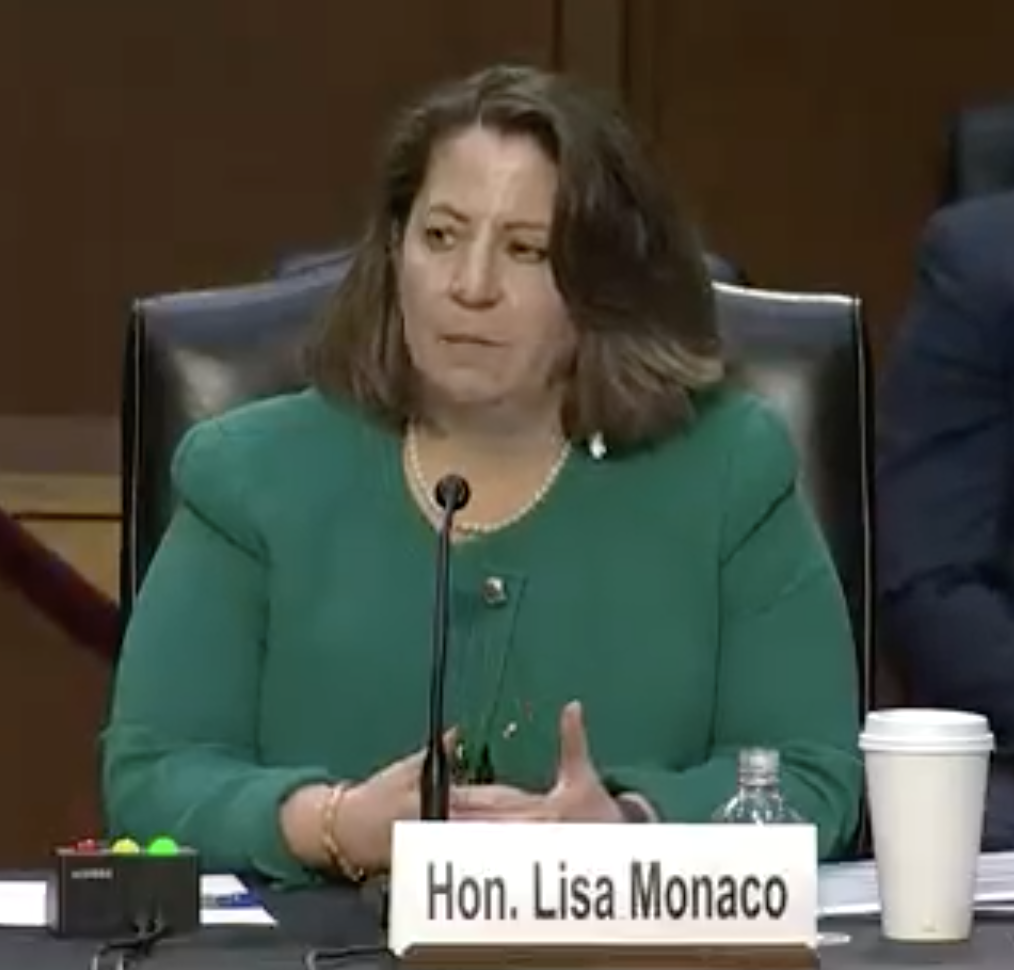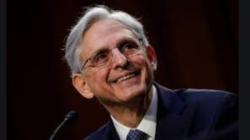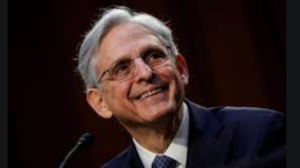Welcome to Lisa Monaco’s DOJ, E Jean Carroll Lawsuit Edition
During Lisa Monaco’s confirmation hearing, several people joked about how few questions she was getting. Because Vanita Gupta had been targeted by Republicans, Monaco was left for broad swaths of the hearing, a spectator to that effort.
There were some good exchanges. In addition to complaining about DOJ’s refusal to respond to questions from Democratic members of Congress, Sheldon Whitehouse asked about OLC, to which Monaco provided an anodyne answer that was enough for Whitehouse, who was going to vote for Monaco one way or another. Josh Hawley asked some legitimately good questions, including about end-to-end encryption. To those questions, Monaco hewed a middle ground and an adherence to the laws on the books. John Cornyn asked the same question Republicans harped on with Merrick Garland, whether she would let John Durham finish his work, to which she responded that her job is to make sure he has the resources to do so, which (while more nuanced that it sounded) shut down that line of questioning.
It was a testament to how shallowly Republican staffers interpreted Lisa Monaco’s long career that Chuck Grassley asked Monaco whether she had involvement in Crossfire Hurricane — the answer was obviously no, given her White House role at the time. But Grassley didn’t ask whether her position at the nexus of Mike Flynn’s efforts to obtain information from the Obama White House in advance of making calls with Sergey Kislyak that Flynn lied to hide would affect her view of the Russian investigation. Perhaps only Susan Rice was more personally betrayed by Mike Flynn’s outreach to Russia, and yet Republicans seemed to not even realize that Flynn and KT McFarland sent Tom Bossert to query Monaco in advance of Flynn’s covert call with Russia, making her the Obama person most directly victimized by Flynn’s underhandedness.
That blithe ignorance of how Monaco’s personal history might affect her tenure extended beyond the Senate Judiciary Committee. For example, while every Assange supporter has targeted Biden and Garland for their pleas to drop the Assange prosecution, none have thought about the fact that Monaco was in charge of the response to the 2016 Russian interference campaign that led even WikiLeaks sympathizers in the Obama Administration to completely reconsider Assange’s game and his longterm relationship with Russia (then again, Assange supporters, almost to a one, have convinced themselves to believe bullshit propaganda about that decision being made under Trump).
Most people have failed to ask these questions about Monaco’s career experiences, even though as Deputy Attorney General, Monaco runs DOJ on a day-to-day basis and makes a lot of these decisions and serves as a key advisor to Garland where she doesn’t.
As a result of the very surface approach to Monaco’s career, there were a whole slew of questions in her confirmation hearing that should have been asked (and should be asked before Monaco’s close associate Matt Olsen is confirmed as National Security Division head), but were not. When Lisa Monaco was Robert Mueller’s top advisor in 2006, for example, what role did she play legalizing the phone dragnet aspiring to collect the phone records of all Americans under FISA’s Section 215? Given her past failures to fulfill promises of transparency, specifically as it relates to FISA, what can she do to ensure she will deliver on such transparency as Deputy Attorney General? What was her role in the execution of Anwar al-Awlaki, and what does that say about her willingness to support unfettered executive authority? With the value of hindsight, does Monaco believe that she was suckered into continuing John Brennan’s permissive approach to drone strikes as White House Homeland Security Advisor, and if so what would she do to give herself the leverage to actually change bad policies baked in by her predecessors?
Don’t get me wrong: Monaco has almost unparalleled qualifications to be Deputy Attorney General, she brings a lot of great qualities to the job, and I’m sure she’s a lovely person. But there was almost no consideration about what affect her long tenure at DOJ and in National Security roles would have on her view towards Presidential authority and DOJ institutional precedent before she was confirmed.
Indeed, in perhaps the question that got closest to asking how she would treat initiatives from career DOJ officials already in place, Monaco explained to Amy Klobuchar that she viewed her job as to empower the people at DOJ she believed operated from an inherently unpartisan stance.
Klobuchar: After the last four years where civil servants withstood political interference, what do you see your role is as restoring the trust in the Department of Justice?
Monaco: Well Senator, as I said in my opening remarks, I think that the career men and women of the Justice Department are its backbone. They’re the people that enforce the law independently, faithfully, fairly, impartially, without any consideration of improper motive. I think they simply want to do their job. They want to do their job with the resources and the tools to keep the American people safe, to prosecute violent crime, to administer justice with compassion, and with humility, as Judge Garland talked about before this committee. And they want to see equal justice under law, and they want to do the work that this Committee has done on a bipartisan basis to administer criminal justice reform. And so I think my role is to ensure that they’ve got the tools and resources to do their job and to protect them from improper influence, any partisan motive, because I think they just want to do their job.
This is the belief system that leads Monaco to respond to a question about career DOJ prosecutor John Durham’s clearly politicized investigation by saying that her job is to make sure he has the resources he wants to continue that investigation.
In her role at DOJ, Monaco has overseen some key wins: with the announcement yesterday that FBI had seized much of the ransomware payment that Colonial pipelines had paid Dark Side hackers, with her quiet presence on the public line listening as Paul Hodgkins made the first pure guilty plea of the January 6 investigation, with the decision — on her first full day in office — to let SDNY resume its investigation into Rudy Giuliani’s foreign influence peddling.
But also under her leadership, DOJ has delayed notice to NYT about an effort to get their Internet records in a clearly politicized investigation. DOJ has moved to hide the contents of a Bill Barr memo that clearly abused his authority and the role of OLC (and with that decision, protected career employees who were making similarly dubious claims when Monaco ran the National Security Division). DOJ has defended a lot of legal stances that were obviously political on their face, most recently and egregiously by sustaining DOJ support to give Trump immunity from suit in his attack on alleged rape survivor, E. Jean Carroll. That is, as she did before with Cheney’s Stellar Wind and Brennan’s drone program, Monaco seems to have chosen not to make a clean break from the horrible policies of her predecessors, choosing instead to ensure the continuity of the institution.
Again, Lisa Monaco oozes intelligence and competence; she’s undeniably qualified to be where she’s at. But she also got where she’s at by cleaning up the messes left by Stellar Wind, the torture program, and John Brennan’s drone program by improving those shitty policies without demanding any accountability for the abuse of DOJ and presidential authority they entailed. Plus, as a career DOJ official, she’s going to defend professionals who did stupid things on the orders of a deeply politicized boss.
Particularly in the wake of the decision to defend Trump against Carroll’s suit, people are wondering how Merrick Garland could make such a horrible decision. My suspicion is they would be better asking what Lisa Monaco’s role was in the decision.




